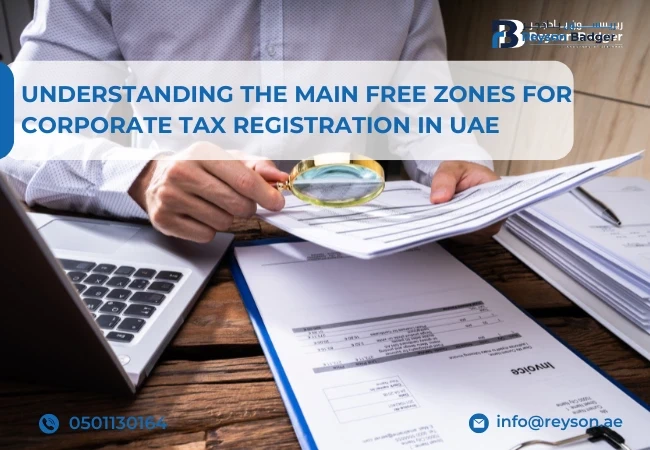Understanding the Main Free Zones for Corporate Tax Registration in UAE
Written By Akshaya Ashok, Reviewed By Nouphal P C
Published on 05/12/2024

The United Arab Emirates is on a new path towards improving the business environment with the UAE Corporate Tax Law enacted as Federal Decree-Law No. 47 of 2022. The main thrust of this law would be toward promoting economic growth, transparency, and a better adherence to international tax standards. This law thus falls as crucial in the midst of various concerns that directly relate to how this will impact the various businesses operating within UAE's free zones. There has been a long record of entrepreneurship and innovation in the free zones, and with corporate tax registration becoming increasingly essential, it helps companies to stay ahead of the competition. This blog is prepared on the provision of free zone corporate tax and corporate tax registration in the free zone and then discusses the benefits and eligibility criteria before discussing how to register. Understanding these complexities will make way for smooth compliance, tax efficiency optimization, and greater prosperity for businesses amid the economic shifts in the UAE.
What are Free Zones in the UAE?
Free zones in the United Arab Emirates (UAE) are designated areas of business that host businesses under a unique tax, customs, and import regime. As free zones have their own rules of operation that differ from those of the rest of the UAE legal framework, they maintain smooth, business-friendly practices. Some major advantages of free zones are:
- 100% Foreign Ownership: Companies in free zones can be 100 percent owned by foreign investors without the need for a local partner. Nothing but mainland companies.
- Tax Exemptions: Companies operating in free zones usually are granted large tax advantages including exemptions from corporate taxes for up to 50 years and with no personal income taxes.
- Repatriation of Profits: Businesses can repatriate 100 percent of their capital and profits without any restrictions.
- Duties: Generally, the goods imported into free zones are exempt from duties for customs, which makes trade easier.
- Easy Business Setup: The process of setting up a business in a free zone is usually simpler and faster compared to mainland setups.
Types of Free Zones
There are several types of free zones in the UAE that target different industries and sectors. Each one is meant to service different business activities. These are:
- Industrial Free Zones are more focused on manufacturing and production-related activities. It provides facilities for factories and warehouses, for example, Dubai Industrial City and Khalifa Industrial Zone Abu Dhabi.
- Technology Free Zones are fundamentally designed to cultivate innovation and technology-based businesses. Infrastructure that caters to the needs of technology-based companies is offered, such as in the case of Dubai Silicon Oasis and Abu Dhabi Global Market.
- Logistics Free Zones strategically located for easy trade and logistics operations, may offer proximity to ports and airports, as with Jebel Ali Free Zone.
- Media and Creative Free Zones target media, entertainment, and creative industries, providing special facilities and support services. Companies such as Dubai Media City and twofour54 are located in Abu Dhabi.
Main Free Zones for Corporate Tax Registration
1. Dubai Free Zones
2. Abu Dhabi Free Zones
3. Sharjah Free Zones
4. Ras Al Khaimah Free Zones
5. Other Free Zones
Tax Advantages and Incentives in UAE Free Zones
Corporate Tax Exemptions or Relief
UAE free zones award tremendous corporate tax exemptions to overseas investment and the growth of the economy. Key aspects include
- No Corporate Tax: Most free zones offer a wholesale exemption from corporate tax for a certain period, which may vary between 15 and 50 years, extendable.
- Qualifying Income: Income sourced from free zone activities or other free zone participants may qualify for such exemptions. However, a free zone participant's income generated from activities in mainland UAE will be taxed at regular corporate tax rates.
VAT Exemptions or Zero-Rating
Businesses operating in authorized free zones are eligible to enjoy specific benefits on VAT :
- VAT Exemptions: Goods imported into and exported from free zones are generally exempt from VAT, making trading easier and reducing operational costs.
- Zero-Rated Supplies: Some supplies made within prescribed zones may be zero-rated, enabling companies to recover input VAT on purchases connected with these supplies
Customs Duty Exemptions
Free zones provide complete customs duty exemptions :
- No Custom Duty: Input items brought into free zones are exempt from custom duty, reducing the cost of doing business of any import-export business.
- Free Movement of Goods: Goods are free to move from one free zone to another without facing the levy of custom duty, hence allowing higher logistical efficiency.
Other Incentives (e.g., no withholding tax)
Besides the above advantages, businesses in UAE's free zones enjoy a number of other incentives.
- No Withholding Tax: No withholding taxes on repatriated dividends or profits of free zone companies. So, complete repatriation of profits without any additional tax burden.
- 100% Foreign Ownership: Investors can fully own their business as they do not require a local partner. This is one very major plus in comparison with mainland company setups.
- Simplified Business Setup: In free zones, the regulatory environment fosters speedy and easy business setup.
Eligibility Criteria and Application Process
Corporate Tax Registration in Free Zones
To be eligible for corporate tax registration in a UAE-free zone, a business must fulfill the following criteria:
- Business Activity: The business activity should be aligned with the objectives of the respective free zone.
- Legal Structure: Companies must typically register as Free Zone Establishments (FZE) or Free Zone Companies (FZC), adhering to the regulations of the respective Free Zone Authority.
- Compliance with Regulations: Businesses must comply with the operational rules set by the free zone authority and relevant UAE laws.
Step-by-Step Registration Process
- Choose a Free Zone: Select the appropriate free zone based on business activities and benefits offered.
- Submit Application: Fill out the application form to the concerned free zone authority with the details of the proposed business activity to be operated.
- Submit Necessary Documents: In such a case, necessary documents to be presented include:
1. Passport copies of the shareholders and directors.
2. Business plan enunciating objectives and operating information
3. Proof of address, if applicable.
- Obtain Initial Approval: After scrutiny of the application, seek initial approval from the free zone authority.
- Lease Office Space: Avail of office space or facilities within the free zone based on your needs.
- Finalize Registration: Complete registration by making the required fees and taking the appropriate licenses (commercial, industrial, etc).
- Tax Registration: Register with the Federal Tax Authority (FTA) for corporate tax if needed.
Documentation and Compliance Requirements
Businesses must keep proper documents during their operation:
- Financial Records: Maintain correct financial statements and records of all transactions.
- Tax Compliance Documents: Tax filing on time as well as VAT compliance in case applicable.
- Operational Records: Maintaining records that show conformity with free zone requirements as well as additional specific requirements set by the relevant authority.
Comparison of Free Zones
|
Free Zone
|
Location
|
Focus Area
|
Corporate Tax Rate
|
Ownership
|
Customs Duty
|
Key Benefits
|
- Dubai International Financial Centre (DIFC)
|
Dubai
|
|
0%
|
|
Exempt
|
- Robust regulatory framework, access to global markets
|
- Dubai Airport Free Zone (DAFZA)
|
Dubai
|
|
0%
|
|
Exempt
|
- Proximity to Dubai Airport, efficient logistics
|
- Dubai Silicon Oasis (DSO)
|
Dubai
|
- Technology and Innovation
|
0%
|
|
Exempt
|
- Integrated tech park with residential facilities
|
- Dubai Multi Commodities Centre (DMCC)
|
Dubai
|
|
0%
|
|
Exempt
|
- Comprehensive services for commodities trading
|
- Abu Dhabi Global Market (ADGM)
|
Abu Dhabi
|
|
0%
|
|
Exempt
|
- International financial center with a strong legal framework
|
- Abu Dhabi Airport Free Zone (ADAFZ)
|
Abu Dhabi
|
|
0%
|
|
Exempt
|
- Access to Abu Dhabi Airport, tailored support for aviation
|
|
|
Sharjah
|
|
0%
|
|
Exempt
|
- Cost-effective setup, diverse business activities
|
- Sharjah Airport International Free Zone (SAIF Zone)
|
Sharjah
|
|
0%
|
|
Exempt
|
- Proximity to airport, flexible office solutions
|
- Ras Al Khaimah Free Trade Zone (RAKFTZ)
|
Ras Al Khaimah
|
- General Trading and Manufacturing
|
0%
|
|
Exempt
|
- Low setup costs, wide range of activities allowed
|
|
|
Ras Al Khaimah
|
|
0%
|
|
Exempt
|
- Specialized facilities for maritime-related businesses
|
|
|
Fujairah
|
|
0%
|
|
Exempt
|
- Strategic location for shipping and logistics
|
- Umm Al Quwain Free Zone (UAQFTZ)
|
Umm Al Quwain
|
|
0%
|
|
Exempt
|
- Affordable setup costs, flexible business options
|
Conclusion
Understanding Free Zone Corporate Tax Registration requires a balancing act with the needs of any business, compliance requirements, and what each zone provides. Consulting tax professionals will always help make informed decisions, avoid inaccurate filing, and also cut costs in the long run. Maximizing your business's potential begins with getting the right free zone. For customized guidance and professional advice, contact Reyson Badger, the lead name in corporate tax solutions. Get in touch today to simplify your tax registration process and set your business up for success.

Written By
Akshaya Ashok
Akshaya Ashok is a content writer specializing in creating content focused on accounting and auditing. With over two years of experience, she has developed expertise in crafting professional content for the financial sector.

